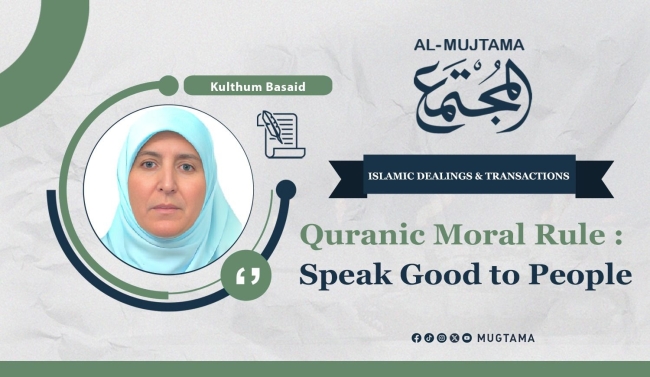Quranic Moral Rule: Speak Good to People
Morals are inseparably linked with religion; what is often called human values are in fact mainly religious values. True humanity does not deviate from true religion by even the slightest measure. Anyone who separates religion from humanity and claims unique values for humanity that diverge from religion is following desires rather than seeking truth. Ibn al-Qayyim al-Jawziyya said, “The religion itself is entirely good character, so whoever surpasses you in character has surpassed you in religion.” (1) Just as people differ in acts of worship, they also differ in morals.
Morals can be verbal or practical. For instance, truthfulness is a verbal moral, evident in speech, where one’s words match one’s actions and one does not lie. On the other hand, modesty, chastity, and honesty are practical morals that manifest through behavior, even without spoken words.
One of the moral principles mentioned in the Quran is: “And speak to people good [words].” (Al-Baqarah: 83) This principle was among the covenants Allah took from the Children of Israel. Allah says, “And [recall] when We took the covenant from the Children of Israel, [enjoining upon them], 'Do not worship except Allah; and to parents do good and to relatives, orphans, and the needy. And speak to people good [words] and establish prayer and give zakah.' Then you turned away, except a few of you, and you were refusing.” (Al-Baqarah: 83)
Allah placed this moral principle between monotheism and acts of worship: monotheism in the phrase “Do not worship except Allah” and acts of worship in “and establish prayer and give zakah.”
With parents, it is “good” and with people, it is “good words.” Thus, it was fitting to command them to speak kindly to people after commanding them to act kindly towards them, combining both verbal and practical kindness. This directive to worship and be kind to people is reaffirmed by specifying acts of worship like prayer and zakah. (2)
Words hold great power; with a word, one can affirm faith, or another can reject it. Words can start wars or forge treaties and reconciliations. The Prophet Muhammad (peace be upon him) advised Mu'adh to control his tongue. When Mu'adh seemed to underestimate the importance of this advice, he asked the Prophet, “Shall we really be punished for what we talk about?” The Prophet replied, “May your mother be bereft of you (I am surprised at you), Mu'adh! Will anything but the harvests of their tongues overthrow men in hell on their faces (or, on their nostrils)?” (3)
The term “good” in “And speak to people good [words]” encompasses all meanings of goodness. (4) In the commandment to be good to parents, Allah says, “And We have enjoined upon man goodness to parents.” (Al-Ankabut: 8), meaning He has enjoined all forms of goodness. For people in general, He commanded some of what He commanded for parents by saying, “And speak to people good [words].” (5)
Good speech has a broad meaning, including soft words, kind speech, enjoining what is right, forbidding what is wrong, patience, forgiveness, and truthfulness. (6) The general meaning is to interact with people with good character, as commanding good interaction and good morals with people. (7)
In the ayah: “And [recall] when We took the covenant from the Children of Israel, [enjoining upon them], 'Do not worship except Allah; and to parents do good.'” (Al-Baqarah: 83), when mentioning worshiping Allah followed by kindness to those mentioned, where most of what is required is action, such as connecting, feeding, and checking on others, Allah then follows with good speech to combine the covenant fulfillment of obeying Allah in actions and words. Since speech is easy to achieve, as it involves words and not money, it applies to people in general, as there is no harm to a person in being kind to others with good words. (8)
Allah commanded actual kindness where it is necessary and within the ability of the commanded, like kindness to parents, relatives, orphans, and the needy, and giving zakah. He also commanded verbal kindness when action is not possible.
The ayah uses the general term “people;” some speak kindly to those they love or are close to, but harshly to those they do not know or disagree with in opinion, sect, or religion.
In this ayah, Allah reminds the Children of Israel of the commands He gave them, the covenants He took from them, and how they deliberately turned away from all of it. (9) Whoever opposes and mistreats others is like the Children of Israel who broke the covenant Allah took from them.
Islam considers people's circumstances; peaceful individuals fall under the general rule of “And speak to people good [words].”
However, those who are oppressive and overstepping may be treated harshly as it falls under the Quranic principle: “Allah does not like the public mention of evil except by one who has been wronged.” (An-Nisa: 148); thus, there is no harm for the wronged to retaliate with equal wrong and publicly mention evil against the oppressor. (10)
For those who are combatant aggressors and sinful, harshness and fighting are the responses as it falls under the Quranic principle: “O Prophet, fight against the disbelievers and the hypocrites and be harsh upon them.” (At-Tawbah: 73)
-------------------------------------------------------------
- Madarij al-Salikin (2/307).
- Tafsir Ibn Kathir (1/317).
- Reported by At-Tirmidhi.
- Tafsir al-Tabari (2/295).
- Ibid.
- Tafsir al-Tabari (2/296), Tafsir Ibn Kathir (1/317), and Fath al-Qadir by Al-Shawkani (1/127).
- Bahr al-Ulum by Al-Samarqandi (1/69).
- Tafsir al-Bahr al-Muhit (1/453).
- Tafsir Ibn Kathir (1/316).
- Tafsir al-Qurtubi (6/1).


